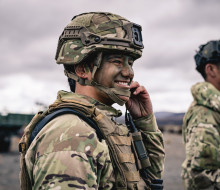
Keeping skills alive in transfer to Reserve Force
05 July 2024
Unfortunately you are viewing this website on an outdated browser which does not support the necessary features for us to provide an adequate experience. Please switch to a modern browser such as latest version of Google Chrome, Mozilla Firefox, Apple Safari or Microsoft Edge.
Ngā mihi nui
Able Writer Mele ‘Ake and her brother, Able Chef Paul ‘Ake, joined the Navy together in 2020. She was 19 and he was 17.
Mele was his ‘rock’ during Basic Common Training, says Paul. “It’s a memory I’ll cherish forever, joining with my sister.”
Mele remembers graduation day vividly. “I ran up to my little brother on the day of our graduation crying as we were really proud to finally be called sailors of the Royal New Zealand Navy.”
She and her brother are Tongan, raised in Otara in South Auckland. “I joined along with my little brother because I wanted to help my parents financially and I thought it would be great to serve our country with my brother at my side.”
Paul says chefing has taught him so much about working in a team. “I love to cook and I love seeing smiles as sailors come through the slide for meal times.” He served on board HMNZS Canterbury during the ship’s relief mission to Tonga following the volcanic eruption in January. “Times can get pretty hectic but you learn to enjoy it. Something I miss about being home is being surrounded by my family. Like many others, I have learned to adapt and maintain a healthy work ethic. Joining the RNZN would have to be one of the best decisions I have made.”
He spent two years living in Tonga before joining the Navy. “I’ve seen what life is like back in the homeland, the life my parents lived before migrating to New Zealand. It makes me proud of where I come from.”
I ran up to my little brother on the day of our graduation crying as we were really proud to finally be called sailors of the RNZN.
Able Writer Mele ‘Ake

Mele, as a Ship’s Writer or Operational Administrator, describes her role as “behind the scenes”, dealing with Navy personnel’s documents, promotions, leave, awards and postings.
“What makes me proud in being a Tongan is that my people migrate here, Australia, USA and other countries and make something of themselves, so they can provide for those family members who still remain back home due to elderly family members not being able to travel or just not having the opportunity or chance to move out and explore.
“I am quite fluent in my cultural language and I am proud that I grew up hearing Tongan at home and at church because it gives me the opportunity to communicate with my family back home.”
Her favourite Tongan proverb is ‘Holo pe tu’u, ko e naglu e fasi’. “This means ‘Stand firm and the waves will break’.”
“To me it means no matter the situation, no matter how bad it may seem, if you stand firm and keep your head up nothing will break you down. You will overcome those obstacles, trials of life and they will be the ones broken. Not you.”